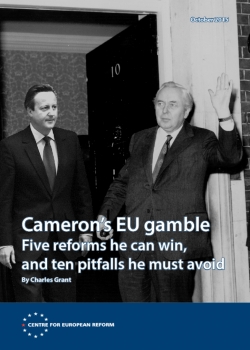
Cameron's EU gamble: Five reforms he can win, and ten pitfalls he must avoid
As in 1975, a British prime minister is trying to win a new deal from the EU, before holding an in-or-out referendum. David Cameron will probably achieve reforms in five areas:
1) Making the EU more competitive. Everyone will agree on extending the single market into new areas and on the need for better regulation.
2) Curbs on benefits for EU migrants. Reforms to Britain’s own welfare system will make it harder for EU migrants to claim out-of-work benefits. The rules on payments to migrants’ children living abroad may be changed. But Cameron will struggle to curb immigrants’ rights to in-work benefits, like tax credits.
3) A bigger role for national parliaments. The Commission will find it harder to push ahead with draft laws if national parliaments object.
4) Changing the treaties’ commitment to ‘ever closer union’. Words will be found that allow Cameron to claim that the EU is a multi-currency union.
5) Safeguards for the wider EU against the risk of the eurozone caucusing. The UK may secure the promise of a new treaty article, greater transparency of Euro Group meetings and a mechanism to allow non-euro countries to delay decisions that they fear will harm the single market.
But even with these reforms, David Cameron will find it much harder to win his referendum than Harold Wilson did in 1975. At least ten things could make victory elusive:
- Cameron’s deal will not be dramatic enough to impress many people.
- Divisions in the Conservative Party could derail Cameron’s strategy.
- The British brand is tarnished in other member-states, which weakens Cameron’s hand in the renegotiation.
- Other EU governments may be less willing to help Cameron than many Britons imagine.
- Rows on migration or a deterioration of the refugee crisis would damage the EU’s image.
- So would a worsening of the euro crisis.
- The Out campaigns will be better-funded than the In campaign.
- The Out campaigns have strong arguments that are hard to counter in simple terms.
- The Labour Party is in turmoil and the trade unions have cooled on the EU.
- Britain’s business leaders will be less supportive of the EU than they were in 1975.
Cameron is more likely to win the referendum if Britain’s European partners give him a couple of reforms that allow him to say the EU will work better for Britain. The most important topic politically is the right of EU migrants to claim benefits. But on substance the key issue for the UK is the need for safeguards to protect the single market and the wider EU against the possibility of harmful actions by the eurozone.

